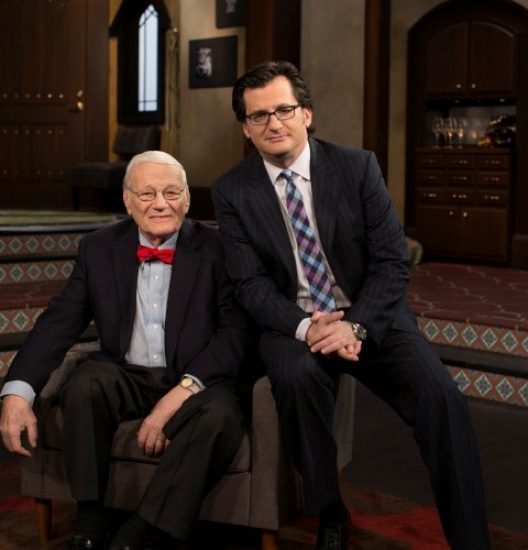Q&A: Turner Classic Movies Host Ben Mankiewicz Discusses His Father Frank’s Very Eventful Life, Legacy and New Memoir
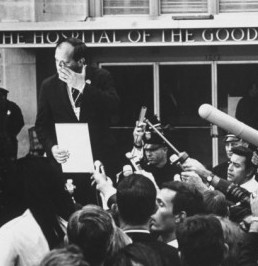 He is perhaps best remembered by a shocked nation as the man who took to the podium at 2 a.m. on June 6, 1968 and informed the world that Senator Robert F. Kennedy had died from an assassin’s bullet. But in addition to serving as the press secretary and close aide to Kennedy, Frank Mankiewicz also ran George McGovern’s 1972 presidential campaign, was a member in good standing of Richard Nixon’s famed enemies list, once explained the intricacies of American baseball to Fidel Castro and as National Public Radio CEO, he helped to create the iconic brand we now listen to daily.
He is perhaps best remembered by a shocked nation as the man who took to the podium at 2 a.m. on June 6, 1968 and informed the world that Senator Robert F. Kennedy had died from an assassin’s bullet. But in addition to serving as the press secretary and close aide to Kennedy, Frank Mankiewicz also ran George McGovern’s 1972 presidential campaign, was a member in good standing of Richard Nixon’s famed enemies list, once explained the intricacies of American baseball to Fidel Castro and as National Public Radio CEO, he helped to create the iconic brand we now listen to daily.
He was also the son of Oscar-winning “Citizen Kane” screenwriter Herman Mankiewicz and the nephew of Oscar-winning “All About Eve” screenwriter and director Joseph L. Mankiewicz.
But for Turner Classic Movie viewers, Frank Mankiewicz was TCM host Ben Mankiewicz’s proud dad who appeared on the cable network in 2013 to co-host a hand-selected line up of movies with his son on Father’s Day (it should also be noted that he once dutifully sat through the 1977 Burt Reynolds vehicle “Smokey and the Bandit” twice with his Trans Am transfixed youngest son). Later that year, he twice packed the main ballroom on the TCM Classic Cruise as the political and Hollywood raconteur delighted movie fans with his stories from an eclectic career.
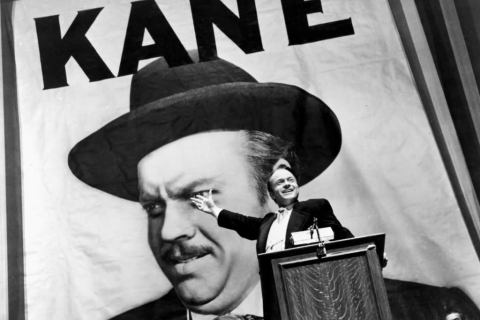
In 2014, Frank Mankiewicz died at age 90 but luckily for us, he collected his best stories into a fascinating and very funny new memoir, “So As I Was Saying…My Somewhat Eventful Life” with Joel Swerdlow (St. Martin’s Press, $26.99).
In between film introductions with his son on the TCM set in Atlanta in 2013, Frank Mankiewicz granted me a 30-minute interview in the green room to discuss his storied career. During our chat for Atlanta magazine, he playfully groused about the editorial urgency being applied as he cranked out the remaining pages of the book.
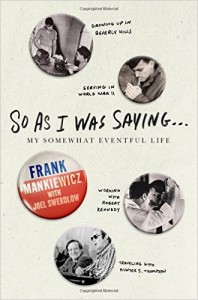 On the occasion of the release of “So As I Was Saying,” Ben Mankiewicz took some time away from his busy TCM shooting schedule in Atlanta to discuss his dad’s life, legacy and his very funny funeral.
On the occasion of the release of “So As I Was Saying,” Ben Mankiewicz took some time away from his busy TCM shooting schedule in Atlanta to discuss his dad’s life, legacy and his very funny funeral.
Q: There are many Sunday afternoons when you’re beamed into all of our homes and you’re introducing Steve McQueen as the King of Cool. I’m reading through your father’s memoir and here’s a guy who is described by Hunter S. Thompson as “a scurvy, rumpled treacherous little bastard,” a guy who was on Richard Nixon’s famed enemies list and a guy who, when he was a Hollywood lawyer in the 1950s got Steve McQueen out of not one but two moving violation citations on the same day. Isn’t there a good argument that Frank Mankiewicz could also be called the King of Cool?
A: Yes, my dad was the epitome of cool, just not in the Hollywood sense. For instance, we never had a meal together where some part of that meal did not remain on his shirt for the rest of the day. That kind of takes you out of the typical Hollywood definition of cool.
Q: And he was doing it in a bowtie, right?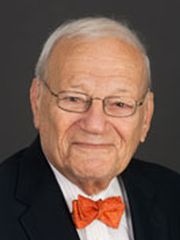
A: Yes, but the bowtie came later in his life. For many years, a necktie served as the only buffer to his shirt. You’d look at the tie and ask, “So dad, how was the corn chowder today?”
Q: When I interviewed him in 2013, he alluded to being dragged kicking and screaming across the finish line with this memoir. What was the state of the manuscript at the time of his death?
A: It was 100 percent finished as far as he was concerned. It was not 100 percent finished as far as the publisher was concerned. He was down to those conversations like, “Let’s tell that story in a different way” and “Can you provide more details on that?” And despite his kicking and screaming, he loved doing it. He didn’t need to be talked into it. But he had no interest in writing what is commonly referred to as a “tell-all.” He had zero interest in humiliating people he respected. And anyone who knew him knew that writing that kind of book would never have occurred to him. He had to figure out a way to write about the things people cared about like Hollywood and the Kennedys but to talk about it in a way that would satisfy his respect for those people, specifically the Kennedys, and specifically, Bobby. It was about 93 percent done when he died. He died unexpectedly, which is odd to say because he was 90. Joel Swerdlow, his co-writer, took the lead on refining things, based on their conversations together. I thought I would help out more with it but I learned that I wasn’t ready. It was harder for me than I anticipated. I didn’t read the book for a long time.
Q: One thing that struck me while reading Kerry Kennedy’s recent Huffington Post tribute to your dad was that he felt a real responsibility to Bobby’s children, decades after his assassination. He kept the memory of their dad present in their lives, even meeting them regularly for lunch, right?
A: It was really one of the things about my father that I didn’t know. Let me be clear — I was well aware of my father’s reverence for Bobby Kennedy. That was obvious. But I didn’t realize how close he was to some of his kids. How much would I have loved to tag along to lunch with my father and Kerry Kennedy and Kathleen Kennedy Townsend! I learned a lot reading his book. I didn’t know, for instance, that every November 20 he went to Bobby’s grave to pay his respects on his birthday. He just mentioned it in passing a few years before he died. So, last year I went for him. It was difficult but nice. I’m hoping to go every year. It was important to him so it’s important to me.
Q: One of my favorite stories from the book mixes pathos and slapstick when he and Bobby Kennedy decide to go to Arlington Cemetery in 1966 to check on the progress of the JFK gravesite and end up scaling a seven-foot chain-link construction fence…
A: Right? I never heard that story until I read it in the book. My father wasn’t the type of guy to drag his kid to a graveyard, even if it was an important graveyard. He probably felt that it was his burden to bear, not his children’s’.
Q: So, your dad and Bobby Kennedy are examining the progress on the JFK grave and Bobby asks, “What do you think?” and your father pulls the unvarnished truth out of his pocket and says, “Eh, it’s not great. It’s too opulent.” A lot of people would have been polite and said, “Oh, it’s fine.” Does that speak volumes about your dad’s character?
A: Yeah, it was my dad being candid without being mean. Kerry Kennedy mentioned that story as well. But the Eternal Flame became something bigger than anyone could have imagined. My father’s later analysis might have been, “You know, that actually did turn into something nice.” It seemed like too much at the time, but it came to mean something separate than its grandeur. That said, he was also satisfied that Bobby’s marker is so simple.
Q: I was fascinated to learn that your father credits you getting the job at TCM for providing the incentive to watch some of Herman and Joseph Mankiewicz’s films, seeing some of them for the first time and making a serious assessment of the work. Did that surprise you?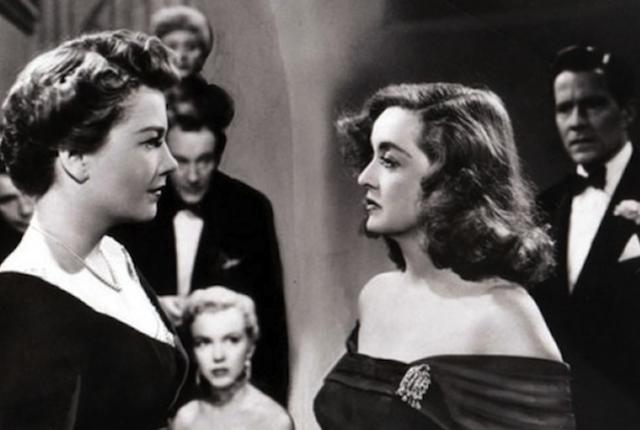
A: I’m of two minds on that. I’m enormously appreciative that my father would write that. Secondly, he might have been helping me out. Did my father watch Turner Classic Movies religiously before I got there? No. But he didn’t immediately tune in when I first started working there, either. But about five or six years into the job, every time I called the house at night, they were watching TCM. I think it’s certainly true that he was exposed to the films Herman wrote and the ones written or directed by Joe that he hadn’t seen. He didn’t have a film library. But we saw a lot of movies together. The book sort of suggests a distain for movies, for the family business if you will, that I never got from him. But I did know that when he didn’t want to pursue that as a career, my grandfather Herman was enormously proud of that decision. Herman was kind of disgusted for being a screenwriter and was thrilled that my dad, who was by far, the smartest person in the family, wanted to go into another profession. My dad clearly got a new or renewed appreciation for the films watching them on TCM.
Q: One thing the memoir brilliantly illustrates is the immense scope of your father’s life. He is a guy who goes from being a kid and Orson Welles and the Mercury Theatre On The Air actors would drop by the house on Sunday to rehearse after wreaking havoc on America with “The War of the Worlds” broadcast and he goes on to redefine National Public Radio, creates Morning Edition and helps to boost the careers of female journalists like Linda Werthheimer and Cokie Roberts, broadcasters who have become icons. That’s a well-lived life, isn’t it?
A: Absolutely, and he killed a few Nazis in his spare time. That’s always worth mentioning, too. He lived an amazing life in an amazing time. He loved books and he also loved technology. He sent me an email everyday. At age 88, we got him a smart phone to replace his old flip phone. He wanted a device where he could get the Cardinals score at any time.
Q: There are very few people who die and their funeral is later described as “raucous” and “hilarious.” Your dad’s was. You were there, of course, wearing one of your dad’s signature bowties. Can you walk us through that?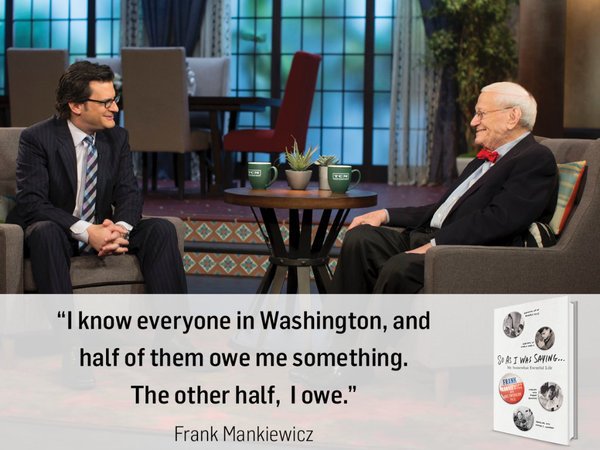
A: [MSNBC commentator] Chris Matthews later told me it was one of the funniest funerals he had ever been to. Both my brother Josh and I spoke. When I wrote my eulogy — this is weird to admit because I love my dad and I miss him so much — but I kept going over it and thinking, “Nah, this isn’t funny enough.” I literally remember thinking after my dad’s funeral, “Oh, yeah, killed it!” Everyone was laughing. But that was the point. As my brother observed, dad would have loved being there and he wouldn’t have wanted it to end.
[amazon_link asins=’1250070643,0812905059,B01K16V9P2,0812906497′ template=’ProductCarousel’ store=’eldredgeatl-20′ marketplace=’US’ link_id=’f09e39d4-0eed-11e9-85d0-331238956f77′]

Richard L. Eldredge is the founder and editor in chief of Eldredge ATL. As a reporter for the Atlanta Journal-Constitution and Atlanta magazine, he has covered Atlanta since 1990.

